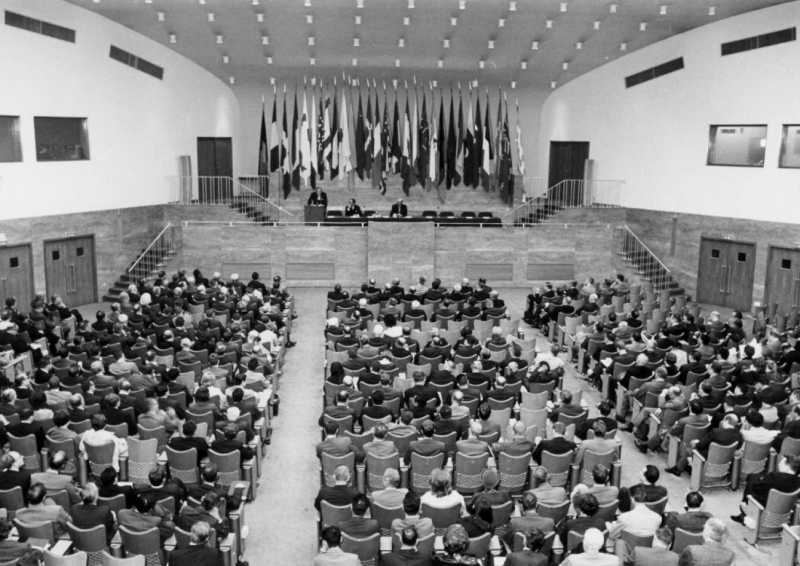
Over the course of its history, the IPSA has striven to attain two objectives: to spread political science as widely as possible geographically (a subject we shall deal with in the third part of this survey) and to contribute to the intellectual development of the discipline. With regard to this second point, the Association’s concern was to help ensure the legitimacy and autonomy of political science with respect both to other disciplines and the political world.
When we undertook to deal with ideologies, it was
understood that the subject would interest the department
[of social sciences of UNESCO] and that we would get a
grant. Meanwhile, unfortunately, the department head
changed, and the new head said the subject was of no
interest [to anyone] outside the small circle of the IPSA!
At that point, [the department director] Mrs. Myrdal
urged us to study local government, but since local government
had not been the subject of a resolution 3.36 or
4.72, there was no possibility of finding the least bit of
financing for it. In the end, we were left with the political
role of women, a subject I have to say I’m far from keen
on, but which UNESCO thinks justifies making large
grants.[Translation]
Jean Meynaud
Executive Secretary, 4 February1952.
3.1. Attaining disciplinary and political autonomy
The IPSA’s financial dependence on UNESCO put it in a delicate situation in terms of its intellectual orientations. It had to submit to the ideas, goals, and missions of its sponsoring agency, while trying gradually to gain acceptance of its own conceptions of the program, methods, and epistemology of political science. The IPSA thus stood poised between a funding agency with political objectives and a research community with scientific ambitions.
The movement towards autonomy first entailed a break with the positivist epistemology inspired by the natural sciences that UNESCO associated with the social sciences in the early years. The IPSA tended to react with annoyance to these epistemological prescriptions, as illustrated by the following comment by Jean Meynaud to Kazimierz Szczerba-Likiernik of UNESCO’s social science department on 4 September 1952:
In conclusion, I’d like to make one very friendly criticism. You kindly forwarded your proposals for a document drawn up for the natural sciences department. I read the document without deriving any benefit from it, and I was sorry for the time I wasted on it. At the present stage, the needs and problems of the social sciences are completely novel and specific to them. People in the hard sciences tend to attribute universal value to their arguments and contributions. For once, I’d like the department of social sciences to stop encouraging this extremely futile tendency and leave it to us to decide what suits the disciplines we are responsible for. [Translation]
The relationship with the natural sciences was a minor problem, though, in comparison to the more recurrent question of the autonomy of political science vis-à-vis the other social sciences. As we have seen, autonomy was a core issue in the IPSA project as early as the meeting of 1948, and it resurfaced repeatedly in the early years of the Association.
The political scientists’ wish to set themselves apart from the jurists, historians, and philosophers often took on the tones of a dispute between Moderns promoting an autonomous discipline and Ancients who had reservations about the new techniques of “positive observation.” 21 These disputes periodically gave rise to tensions. For example, in 1952, UNESCO decided to delegate management of its relations with the new international social science associations to the International Social Science Council (ISSC). Understandably, given UNESCO’s role as the principal—if not sole—source of funding for the new associations, a power struggle was bound to erupt over the selection of the ISSC’s secretary general. The IPSA viewed the appointment of a sociologist as dangerous, since sociology was perceived as a discipline with hegemonic pretensions that were hardly compatible with the attainment of autonomy by political science. The Association also opposed the nomination of Claude Lévi-Strauss, who was seen as dangerous on the grounds of his philosophical education:
His training was the agrégation of philosophy, which in France is considered one of the main handicaps to the development of social sciences. He then turned to anthropology and has written a most remarkable book which I believe is on the elementary structures of family relationships. All this does not make him capable of promoting efficiently political science or economics. Lévi-Strauss belongs to those who do not consider political science a real science. Without any doubt, the political aspects of the contemporary world would be neglected by the council if he were appointed to this position. 22
In the end, Lévi-Strauss was nonetheless named Secretary General of the ISSC.
Similar tensions arose with even greater frequency with regard to the field of law. The most spectacular clash occurred in the ranks of the IPSA itself in the late 1950s during preparations for the Rome Congress (1958). They involved the choice of general rapporteur on the topic of “Executive-Legislative relations.” When François Goguel, who was originally sounded out to take on the role, withdrew, John Goormaghtigh, the Executive Secretary, took it upon himself to ask Georges Vedel. The choice roused strong opposition 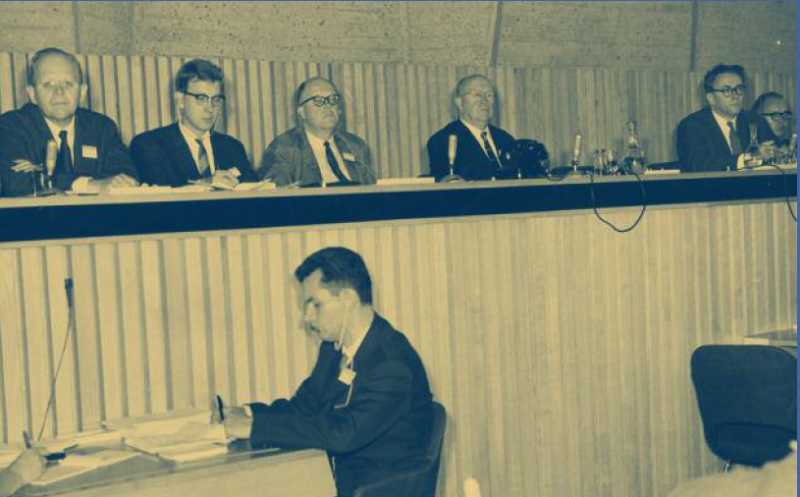 from the President of the IPSA, James Pollock. In his opinion, it was out of the question to invite someone with a background in law to occupy such a prominent role at a political science conference. Very curt letters were exchanged, and it took a fit of anger by Vice President Maurice Duverger and a threat to resign by John Goormaghtigh for Pollock to concede.
from the President of the IPSA, James Pollock. In his opinion, it was out of the question to invite someone with a background in law to occupy such a prominent role at a political science conference. Very curt letters were exchanged, and it took a fit of anger by Vice President Maurice Duverger and a threat to resign by John Goormaghtigh for Pollock to concede.
As time passed, tensions between political science and other disciplines arose less and less often. The explanation for the change is the usual one: the boundaries between the social sciences had gradually become routinized, and succeeding generations normalized the situation. Accordingly, the occasional encroachment by one discipline on the turf of another was decreasingly perceived as a threat to its autonomy.
While relations between political science and the other social sciences were difficult, the ties to the political world were rather ambiguous. The IPSA was, of course, obliged to maintain these relations because of the financial support provided by UNESCO. In exchange for its assistance, the United Nations Educational, Scientific and Cultural Organization exerted a degree of control over the IPSA’s activities. Clearly, it was in the Association’s strategic interest to attach itself to UNESCO’s political program as best it could, even if doing so sometimes meant agreeing to conduct studies of dubious scientific interest. The gamble the Association was making was that “sometimes you can manage to do something useful with less reasonable projects: it all depends on the people that UNESCO puts in charge of carrying out the projects.” 23 At UNESCO’s behest, the IPSA thus contributed to studies on such subjects as “the role of ethnic minorities in international relations” (1950), the “minimum conditions for an effective and permanent Union of States” (1950), and “the political role of women” (1952). However, as the Association became financially autonomous, it gained greater control over its own program. Its control became complete in 1995, when UNESCO decided to provide only project-based funding to the international associations. The IPSA’s links to politics were not, however, restricted to the variable influence that UNESCO exerted on its scientific program. Many Executive Committee members were politically active at the same time as they conducted their scientific activities, especially in the 1950s. For example, Fehti Celikbas was elected to the Turkish Assembly during his term on the Executive Committee, while Gunnar Heckscher, a leading member of the Swedish right-wing party, the Högerpartiet, would probably have become President of the IPSA in 1958 had he not been elected to his country’s parliament a year earlier. Paradoxically, participation in politics—in contrast to relations with the other social sciences—was rather highly valued and considered an opportunity to develop the discipline. To become a politician was to cross to “the other side of the barricades” and possibly gain access to more resources than were available to the “ordinary” political scientist, who was limited by his membership in academe.24 So critical was the contribution deemed, that little mind was paid to the difficulties that might be caused by a political world that was sometimes quite unaccommodating to these “double agents.” For example, France’s Direction Générale des Relations Culturelles refused Maurice Duverger and Roger Pinto financial assistance to take part in the IPSA Round Table in Florence on the—evidently tacit—grounds of the political positions they took regarding the European Defense Community (EDC).25 In 1958, the Association’s operations were disturbed by Maurice Duverger’s absence from the Rome Congress; he had stayed in France to campaign against the constitution of the Fifth Republic. 26
Highly valued though they might be, the presence of politics inside the Executive Committee through the dual role played by some of the members gradually faded and became more occasional. However, this general trend to professionalization on the part of the academics did not, as we shall see, mean that politics were no longer a factor in discussions about the admission of members or the choice of venue for a Congress.
The attainment of autonomous status through the process we have just described of distancing the discipline from both politics and the other social sciences has a major flaw: it makes political science out to be a field that essentially defines itself in negative terms. For a more complete picture, we must also recognize the IPSA’s proactive role in organizing scientific activities and thus contributing to a more “positive” definition of the discipline.
3.2. Promoting political science through a range of activities
Any Programme Committee for a world congress
is cross-pressured. On the one hand, there is a
demand to cater to practically every speciality in
the discipline and, on the other, there is the need
to focus on relevant themes.
Serge Hurtig
Editor of International Political Science Abstracts,
9 January 1980.
The IPSA contributed to the development of political science through a very wide range of activities. The first such undertakings were major studies commissioned by UNESCO that were aimed as much at drawing up an “inventory” of the discipline as at contributing to its growth. Raymond Aron’s “methods in political science” project, which was discussed earlier, laid the foundations for the establishment of the Association. In contrast to the epistemological concerns of that study, the second project, “the teaching of political science,” dealt with more “concrete” matters and focused on university programs. Under the coordination of general rapporteur William A. Robson, who later served as President of the IPSA (1952–1955), the study provided an exhaustive account of the history of academic political science in Sweden, the United Kingdom, the United States, France, Canada, India, Mexico, Poland, Germany, and Egypt. This inventory of recruitment and teaching methods, of the content of syllabuses and degrees, and of the linkage between teaching and research enabled the IPSA to take the measure of the obstacles it would have to overcome in order to attain its goal of harmonization.
These major studies were, however, exceptional in that they were not repeated on a regular basis over the course of the Association’s history. Indeed, the IPSA’s routine activities did not involve large-scale multinational investigations of this type. They centered rather on the organization of academic events, primarily the World Congresses. Over the years, not only has attendance at these triennial gatherings grown—from 88 or so delegates at the Zurich Congress in 1950 to more than 2000 at Fukuoka in 2006—but the philosophy behind them and the way they are organized have evolved. At the first Congresses, presentations and discussion revolved around two or three selected topics, and general rapporteurs were assigned the tasks of organizing and synthesizing them. However, increasing participation and the emergence of the Research Committees made it difficult to structure proceedings around a limited number of rather specific subjects. Change came with the 1976 Edinburgh Congress. Since then, the chair of the Program Committee has been responsible for organizing the event around one broad, inclusive theme, although a number of independent sessions are set aside for the Research Committees and off-theme papers. The themes selected have been “Time, space and politics” (1976); “Peace, development, knowledge” (1979); “Society beyond the State in the ‘80s” (1982); “The Changing State & Its Interaction With National & International Society” (1985); “Towards a Global Political Science” (1988); “Centers and peripheries in contemporary politics” (1991); “Democratization” (1994); “Conflict and order” (1997); “World capitalism, governance and community” (2000); “Democracy, Tolerance, Justice: Challenges for Political Change” (2003); “Is democracy working?” (2006); and “Global Discontent? Dilemmas of change” (2009). As the statement by Serge Hurtig heading this chapter illustrates, drawing up the program for a World Congress is a delicate exercise: dilemmas often arise between the specific and the universal and between “classic” and innovative political science.
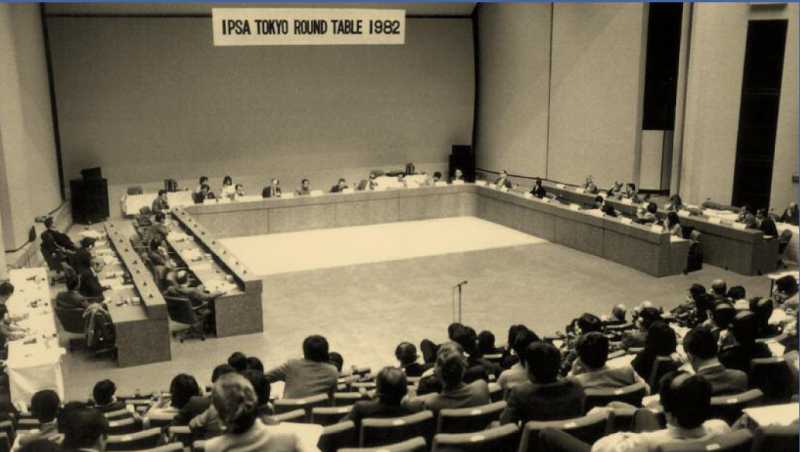
The goals of the Congresses, while partly scientific, are primarily social. Certainly, as Francesco Kjellberg, the Program Committee chair in 1985 and Secretary General from 1988 to 1994, declared, a Congress must “contribute to the strengthening of the comparative aspects of our discipline,” “remind us of the unity of political science,” and “contribute to the rejuvenation of political scientists.” 27 But it must primarily be a locus for exchange and interaction:
The purpose of a Congress like the one we are preparing is to develop interest in political science just about everywhere in the world. We have included a number of scientific themes in our study program and, of course, we hope to obtain valid findings for each of the themes. But scientific work is not the sole aim of an International Congress. Another one is to enable personalities from countries with different cultures to meet, make contacts and thus become aware of their strengths and weaknesses. 28
Important though the World Congresses may be in the life and history of the International Political Science Association, they are not its sole scientific endeavor. Between Congresses, meetings of the Executive Committee have often led to the organization of Round Tables. The first such event was held at Cambridge in 1952 in relation to William A. Robson’s “teaching of political science” study. Since then, Round Tables have been organized on a more or less annual basis. At first, the subjects tended to be rather broad and prefigure one of the themes of the next Congress. However, as the discipline became more specialized and fragmented and, correlatively, as the Research Committees and Study Groups developed, the topics became more specific. The choice of venue for Round Tables has tended to anticipate the location of future Congresses; holding a Round Table gave the Executive Committee an opportunity to evaluate the host university’s ability to organize a larger-scale event.
More recently, the IPSA has added regular symposiums to the events that it organizes. Falling somewhere between Round Tables and Congresses in terms of scale and level of specificity, they are structured around a single theme and allow the Association to “show the flag” between Congresses. The approach behind them is to take an inventory of knowledge on a subject. Symposium topics have included “Elections and party systems in contemporary democracies” (1993); “The challenge of regime transformation: New Politics in Central and Eastern Europe” (1996); “Globalization and the future of nations and states” (1998); “Ethnicity in the first world, the third world and ex-communist countries” (2000); “Mastering globalization: new states’ strategies” (2002); “Democracy and political party financing” (2003); “Web portals for social sciences” (2005); “Cultural diversity, identities and globalization” (2007); and “International Political Science: New Theoretical and Regional Perspectives” (2008).
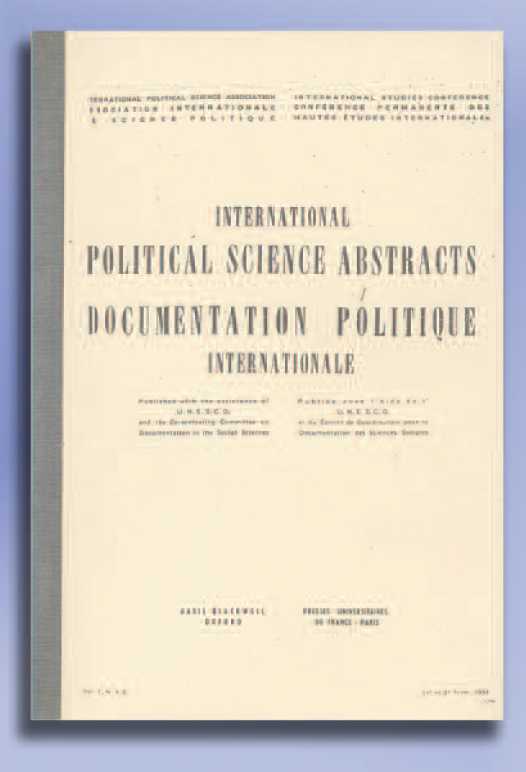 In addition to organizing these events, the IPSA has contributed to the intellectual advancement of political science through its two flagship publications: the International Political Science Abstracts and the International Political Science Review (IPSR). The Abstracts first appeared in 1951, long before the Review, under the direction of Jean Meyriat, who was Secretary General of the International Council for Social Sciences (ICSS) (another organization whose creation was fostered by UNESCO) and head of the Fondation Nationale des Sciences Politiques documentation department. The IPSA and the ICSS also jointly published the International Bibliography of Political Science (IBPS) until it broke away from the IPSA in 1955 and finally ceased publication in 1987. Like the IBPS, the Abstracts took an inventory approach, though in a slightly different form. The IBPS was an annual, and its objective was to compile a list of the main political science publications— both books and articles—that had appeared over the previous year. The International Political Science Abstracts publishes the abstracts of articles from selected political science journals, indexes them and classifies them under six main categories:
In addition to organizing these events, the IPSA has contributed to the intellectual advancement of political science through its two flagship publications: the International Political Science Abstracts and the International Political Science Review (IPSR). The Abstracts first appeared in 1951, long before the Review, under the direction of Jean Meyriat, who was Secretary General of the International Council for Social Sciences (ICSS) (another organization whose creation was fostered by UNESCO) and head of the Fondation Nationale des Sciences Politiques documentation department. The IPSA and the ICSS also jointly published the International Bibliography of Political Science (IBPS) until it broke away from the IPSA in 1955 and finally ceased publication in 1987. Like the IBPS, the Abstracts took an inventory approach, though in a slightly different form. The IBPS was an annual, and its objective was to compile a list of the main political science publications— both books and articles—that had appeared over the previous year. The International Political Science Abstracts publishes the abstracts of articles from selected political science journals, indexes them and classifies them under six main categories:
I/ Political science: method and theory;
II/ Political thinkers and ideas;
III/ Governmental and administrative institutions;
IV/ Political process: public opinion, attitudes, parties, forces,
groups and elections;
V/ International relations;
VI/ National and area studies.
The Abstracts currently cover nearly a thousand journals and publish more than 8,000 abstracts a year, adding to a database of 264,000 references going back to 1951. The Abstracts have established themselves as an essential bibliographic resource and a financially viable undertaking for the IPSA. The periodical’s success is largely due to one person, Serge Hurtig, who succeeded Meyriat in 1963 and has edited the publication for 45 years. Since 2001, he has shared his duties with Paul Godt, who has in turn succeeded him at the head of the publication.
It was not until the late 1970s, long after the Abstracts first came out, that the IPSA really contemplated publishing an International Political Science Review. Ajournal had figured in the projected program of the future organization as early as 1949. The rather surprising delay in implementing the idea is due the fact that for a long time UNESCO put part of its own journal, the International Social Science Bulletin (later the International Social Science Review) at the disposal of the IPSA. Furthermore, organizing Congresses was so demanding an exercise that the secretariat did not have time for so major an undertaking as the publication of a journal. There were ultimately two main reasons why the IPSR was launched in 1980. One was, of course, like the Association itself, to help “bridge [the] gap between countries, ideologies and specialized areas” of political science. More importantly, though, the periodical was to provide an outlet for the high-caliber papers presented at the IPSA’s Congresses and other scientific gatherings. 29
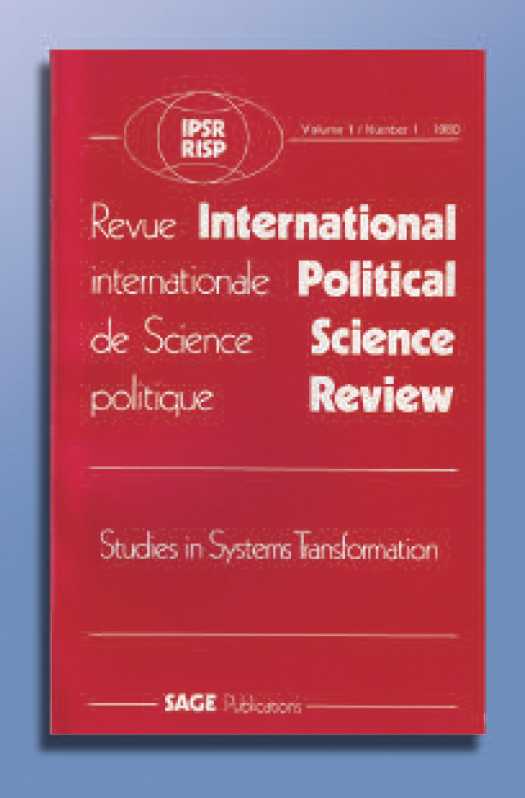 The Review is distinctive in that, from the outset, it adopted the format of guest-edited, themed issues. Judging by the IPSR’s improving financial health and high impact factor, the approach has paid off. Despite a higher turnover than at the Abstracts, the journal’s success is most notably due to the long terms of its editors and co-editors: John Meisel (1980–1996), Jean Laponce (1986–2002), Nazli Choucri (1995–2001), James Meadowcroft (2000–2007), Kay Lawson (2001–2009), and Yvonne Galligan (2007–2009).
The Review is distinctive in that, from the outset, it adopted the format of guest-edited, themed issues. Judging by the IPSR’s improving financial health and high impact factor, the approach has paid off. Despite a higher turnover than at the Abstracts, the journal’s success is most notably due to the long terms of its editors and co-editors: John Meisel (1980–1996), Jean Laponce (1986–2002), Nazli Choucri (1995–2001), James Meadowcroft (2000–2007), Kay Lawson (2001–2009), and Yvonne Galligan (2007–2009).
In addition to the periodicals, since its inception the Association has also commissioned and helped bring out books. During the first thirty years of the IPSA’s operations, there was no long-term book program. There were ad hoc publications based on the work of rapporteurs at Congresses or Round Tables and on studies commissioned by UNESCO. Different publishing houses were used. The books included William A. Robson’s Study of teaching, La participation des femmes à la vie politique by Maurice Duverger (1955), New states and international organizations by Benjamin Akzin (1955), and numerous later works. Not until the early 1980s did the IPSA undertake to bring these assorted publications together under a single banner with the launch of Advances in political science: an international series edited by Richard L. Merritt, who chaired the Program Committee of the 1979 World Congress. Partnerships with a succession of publishing houses proved quite unstable; Sage, Butterworth and Cambridge University Press were each involved in the collection during its first ten years. A new startup was necessary, and a partnership was established with MacMillan in 1995. Since then the collection has grown to several dozen books.
In addition to this “main” series, many books have been produced by the Association’s Research Committees and Study Groups over the years. It is through these two types of groups, more than any other, that the IPSA has taken the initiative and been proactive in producing original research. Stein Rokkan, the vice president of the International Sociological Association (ISA) from 1966 to 1970 and President of the IPSA from 1970 to 1973 suggested “setting up permanent committees that would be responsible for following up the research in a number of fields” 30 as early as 1961. The plan was not put into effect until 1970, but it soon proved a success. On 24 August 1973, three years after the system was set up, the Council unanimously paid tribute to the work of the eight groups that had been given Committee status: their work “spread out and [stressed] the action of [the] IPSA” and “is in itself a proof of the vitality of the Association and a good way to decentralize the scientific activities.”
Three years and two new Committees later, two decisions were made. First, Specialist Groups were established with a status halfway between that of an informal network and a Research Committee so that groups could “prove themselves” before being granted a higher level of institutional recognition. Second, a sub-committee was appointed to study the possibility of giving the Research Committees representation on the IPSA Council.
Three years later, the sub-committee’s work resulted in an amendment to the Association’s constitution. The dynamism of the two types of transnational networks has led to the decentralization of the IPSA’s scientific endeavors to such a point that it now fulfills little more than a “job as a clearing house.” 31 It is consequently difficult to assess the impact of the Groups’ and Committees’ studies on the intellectual development of political science. In organizational terms, the experience has clearly been a success: forty years after they were first set up, there are now fifty active Research Committees in the IPSA. 32
Finally, mention must also be made of the IPSA Portal. With this latest initiative, the Association takes notice of the growing role that the Internet plays in the activities of political scientists. Headed by editor Mauro Calise, the Portal records, classifies, describes, and evaluates some 300 Websites useful to the practice of political science.
The IPSA’s numerous scientific activities are an affirmation of its ambitions for the intellectual development of the discipline. In the main, though, they have been a means to attain what the Association’s constitution proclaims as its main objective: the creation of the conditions for breaking through national boundaries so that a single community of political science researchers can emerge. It was the challenge of internationalization that, without doubt, gave rise to the most intense debates over the course of the 101 sessions of the Executive Committee.
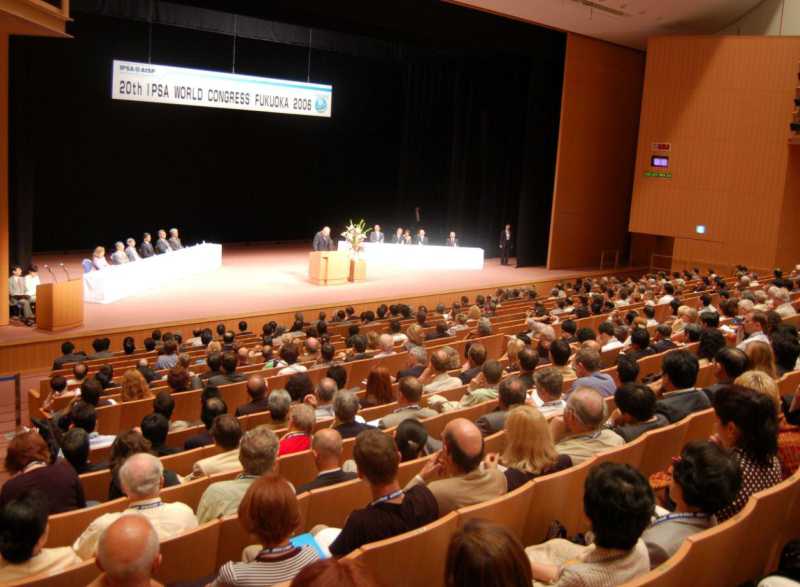
Notes
- Letter from Jean Meynaud to Francesco Vito, 16 January 1951.
- Letter from Jean Meynaud to Francesco Vito, 16 January 1951. Translation
- Letter from Jean Meynaud to William A. Robson, 29 May 1952. Translation.
- Letter from Jean Meynaud to Fehti Celikbas, 26 June 1950. Translation.
- Letter from Jean Meynaud to William A. Robson, 12 February 1954.
- Letter from John Goormaghtigh to Maurice Duverger, 19 August 1958.
- Opening address by Francesco Kjellberg to the 1985 Paris Congress.
- Letter from Jean Meynaud to Phedon Vegleris, 24 May 1952. Translation.
- John Meisel, cited in the records of the IPSA Council meeting, 12 August 1979.
- Letter from Serge Hurtig to Stein Rokkan, 14 December 1961. Translation.
- IPSA, Executive Committee Meeting, August 25th 1973.
- The distinction between Research Committees and Study Groups (which succeeded the Specialist Groups) was abolished in 1999. Only the single category of Research Committees remains, and new Committees have to go through a trial period.











